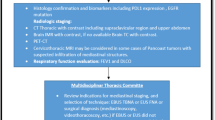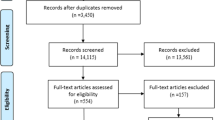Abstract
Goals of work
The goal of this study was to develop a new, objective prognostic score (OPS) for terminally ill cancer patients based on an integrated model that includes novel objective prognostic factors.
Materials and methods
A multicenter study of 209 terminally ill cancer patients from six training hospitals in Korea were prospectively followed until death. The Cox proportional hazard model was used to adjust for the influence of clinical and laboratory variables on survival time. The OPS was calculated from the sum of partial scores obtained from seven significant predictors determined by the final model. The partial score was based on the hazard ratio of each predictor. The accuracy of the OPS was evaluated.
Main results
The overall median survival was 26 days. On the multivariate analysis, reduced oral intake, resting dyspnea, low performance status, leukocytosis, elevated bilirubin, elevated creatinine, and elevated lactate dehydrogenase (LDH) were identified as poor prognostic factors. The range of OPS was from 0.0 to 7.0. For the above cutoff point of 3.0, the 3-week prediction sensitivity was 74.7%, the specificity was 76.5%, and the overall accuracy was 75.5%.
Conclusions
We developed the new OPS, without clinician’s survival estimates but including a new prognostic factor (LDH). This new instrument demonstrated accurate prediction of the 3-week survival. The OPS had acceptable accuracy in this study population (training set). Further validation is required on an independent population (testing set).

Similar content being viewed by others
References
Bozcuk H, Koyuncu E, Yildiz M, Samur M, Ozdogan M, Artac M, Coban E, Savas B (2004) A simple and accurate prediction model to estimate the intrahospital mortality risk of hospitalised cancer patients. Int J Clin Pract 58:1014–1019. doi:10.1111/j.1742-1241.2004.00169.x
Brown DJ, Milroy R, Preston T, McMillan DC (2007) The relationship between an inflammation-based prognostic score (Glasgow Prognostic Score) and changes in serum biochemical variables in patients with advanced lung and gastrointestinal cancer. J Clin Pathol 60:705–708. doi:10.1136/jcp. 2005.033217
Christakis NA, Iwashyna TJ (1998) Attitude and self-reported practice regarding prognostication in a national sample of internists. Arch Intern Med 158:2389–2395. doi:10.1001/archinte.158.21.2389
Christakis NA, Lamont EB (2000) Extent and determinants of error in doctors’ prognoses in terminally ill patients: prospective cohort study. BMJ 320:469–472. doi:10.1136/bmj.320.7233.469
Chuang RB, Hu WY, Chiu TY, Chen CY (2004) Prediction of survival in terminal cancer patients in Taiwan: constructing a prognostic scale. J Pain Symptom Manage 28:115–122. doi:10.1016/j.jpainsymman.2003.11.008
Glare P, Sinclair C, Downing M, Stone P, Maltoni M, Vigano A (2008) Predicting survival in patients with advanced disease. Eur J Cancer 44:1146–1156. doi:10.1016/j.ejca.2008.02.030
Glare P, Virik K (2001) Independent prospective validation of the PaP score in terminally ill patients referred to a hospital-based palliative medicine consultation service. J Pain Symptom Manage 22:891–898. doi:10.1016/S0885-3924(01)00341-4
Glare P, Virik K, Jones M, Hudson M, Eychmuller S, Simes J, Christakis N (2003) A systematic review of physicians’ survival predictions in terminally ill cancer patients. BMJ 327:195–198. doi:10.1136/bmj.327.7408.195
Glare PA, Sinclair CT (2008) Palliative medicine review: prognostication. J Palliat Med 11:84–103. doi:10.1089/jpm.2008.9992
Gripp S, Moeller S, Bolke E, Schmitt G, Matuschek C, Asgari S, Asgharzadeh F, Roth S, Budach W, Franz M, Willers R (2007) Survival prediction in terminally ill cancer patients by clinical estimates, laboratory tests, and self-rated anxiety and depression. J Clin Oncol 25:3313–3320. doi:10.1200/JCO.2006.10.5411
Harrell FE Jr, Lee KL, Califf RM, Pryor DB, Rosati RA (1984) Regression modelling strategies for improved prognostic prediction. Stat Med 3:143–152. doi:10.1002/sim.4780030207
Hawkins WG, DeMatteo RP, Jarnagin WR, Ben-Porat L, Blumgart LH, Fong Y (2004) Jaundice predicts advanced disease and early mortality in patients with gallbladder cancer. Ann Surg Oncol 11:310–315. doi:10.1245/ASO.2004.03.011
Kelly L, White S, Stone PC (2007) The B12/CRP index as a simple prognostic indicator in patients with advanced cancer: a confirmatory study. Ann Oncol 18:1395–1399. doi:10.1093/annonc/mdm138
Lau F, Cloutier-Fisher D, Kuziemsky C, Black F, Downing M, Borycki E, Ho F (2007) A systematic review of prognostic tools for estimating survival time in palliative care. J Palliat Care 23:93–112
Lee IC, Kim CK, Suh SY, Kim YS, Cho KH, Kang HC, Youn BB (2007) Validation of scoring system for survival prediction in terminal cancer patients in Korea. J Korean Acad Fam Med 28:682–689
Llobera J, Esteva M, Rifa J, Benito E, Terrasa J, Rojas C, Pons O, Catalan G, Avella A (2000) Terminal cancer. duration and prediction of survival time. Eur J Cancer 36:2036–2043. doi:10.1016/S0959-8049(00)00291-4
Loprinzi CL, Johnson ME, Steer G (2000) Doc, how much time do I have? J Clin Oncol 18:699–701
Maltoni M, Caraceni A, Brunelli C, Broeckaert B, Christakis N, Eychmueller S, Glare P, Nabal M, Vigano A, Larkin P, De Conno F, Hanks G, Kaasa S (2005) Prognostic factors in advanced cancer patients: evidence-based clinical recommendations–a study by the Steering Committee of the European Association for palliative care. J Clin Oncol 23:6240–6248. doi:10.1200/JCO.2005.06.866
Morita T, Tsunoda J, Inoue S, Chihara S (1999) The palliative prognostic index: a scoring system for survival prediction of terminally ill cancer patients. Support Care Cancer 7:128–133. doi:10.1007/s005200050242
Palmer JL, Fisch MJ (2005) Association between symptom distress and survival in outpatients seen in a palliative care cancer center. J Pain Symptom Manage 29:565–571. doi:10.1016/j.jpainsymman.2004.11.007
Pirovano M, Maltoni M, Nanni O, Marinari M, Indelli M, Zaninetta G, Petrella V, Barni S, Zecca E, Scarpi E, Labianca R, Amadori D, Luporini G (1999) A new palliative prognostic score: a first step for the staging of terminally ill cancer patients. Ital Multicenter Study Group. Palliat Care J Pain Symptom Manage 17:231–239
Ripamonti C, Bruera E (1997) Dyspnea: pathophysiology and assessment. J Pain Symptom Manage 13:220–232. doi:10.1016/S0885-3924(96)00327-2
Rosenthal MA, Gebski VJ, Kefford RF, Stuart-Harris RC (1993) Prediction of life-expectancy in hospice patients: identification of novel prognostic factors. Palliat Med 7:199–204. doi:10.1177/026921639300700306
Shin HS, Lee HR, Lee DC, Shim JY, Cho KH, Suh SY (2006) Uric acid as a prognostic factor for survival time: a prospective cohort study of terminally ill cancer patients. J Pain Symptom Manage 31:493–501. doi:10.1016/j.jpainsymman.2005.11.014
Suh SY, Ahn HY (2007) Lactate dehydrogenase as a prognostic factor for survival time of terminally ill cancer patients: a preliminary study. Eur J Cancer 43:1051–1059. doi:10.1016/j.ejca.2007.01.031
Suh SY, Ahn HY (2007) A prospective study on C-reactive protein as a prognostic factor for survival time of terminally ill cancer patients. Support Care Cancer 15:613–620. doi:10.1007/s00520-006-0208-5
Vigano A, Donaldson N, Higginson IJ, Bruera E, Mahmud S, Suarez-Almazor M (2004) Quality of life and survival prediction in terminal cancer patients: a multicenter study. Cancer 101:1090–1098. doi:10.1002/cncr.20472
Vigano A, Dorgan M, Buckingham J, Bruera E, Suarez-Almazor ME (2000) Survival prediction in terminal cancer patients: a systematic review of the medical literature. Palliat Med 14:363–374. doi:10.1191/026921600701536192
Vitetta L, Kenner D, Kissane D, Sali A (2001) Clinical outcomes in terminally ill patients admitted to hospice care: diagnostic and therapeutic interventions. J Palliat Care 17:69–77
Walenta S, Mueller-Klieser WF (2004) Lactate: mirror and motor of tumor malignancy. Semin Radiat Oncol 14:267–274. doi:10.1016/j.semradonc.2004.04.004
Acknowledgement
This study was supported by a grant from the 2006 Support Fund for Research Group of Korean Academy of Family Physicians. The study sponsors had no role in this study.
Conflict of interest statement
None.
Author information
Authors and Affiliations
Corresponding author
Rights and permissions
About this article
Cite this article
Suh, SY., Choi, Y.S., Shim, J.Y. et al. Construction of a new, objective prognostic score for terminally ill cancer patients: a multicenter study. Support Care Cancer 18, 151–157 (2010). https://doi.org/10.1007/s00520-009-0639-x
Received:
Accepted:
Published:
Issue Date:
DOI: https://doi.org/10.1007/s00520-009-0639-x




